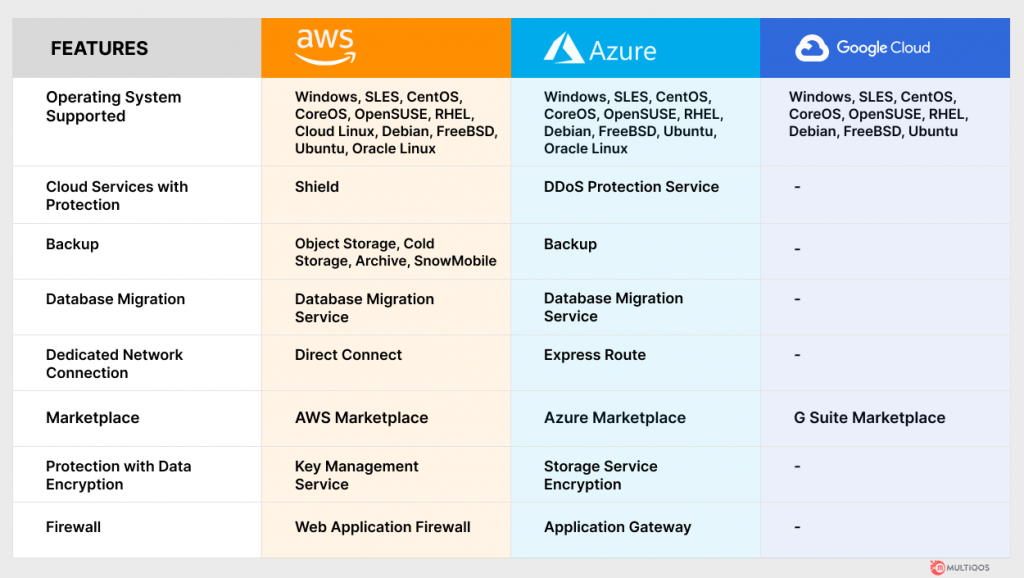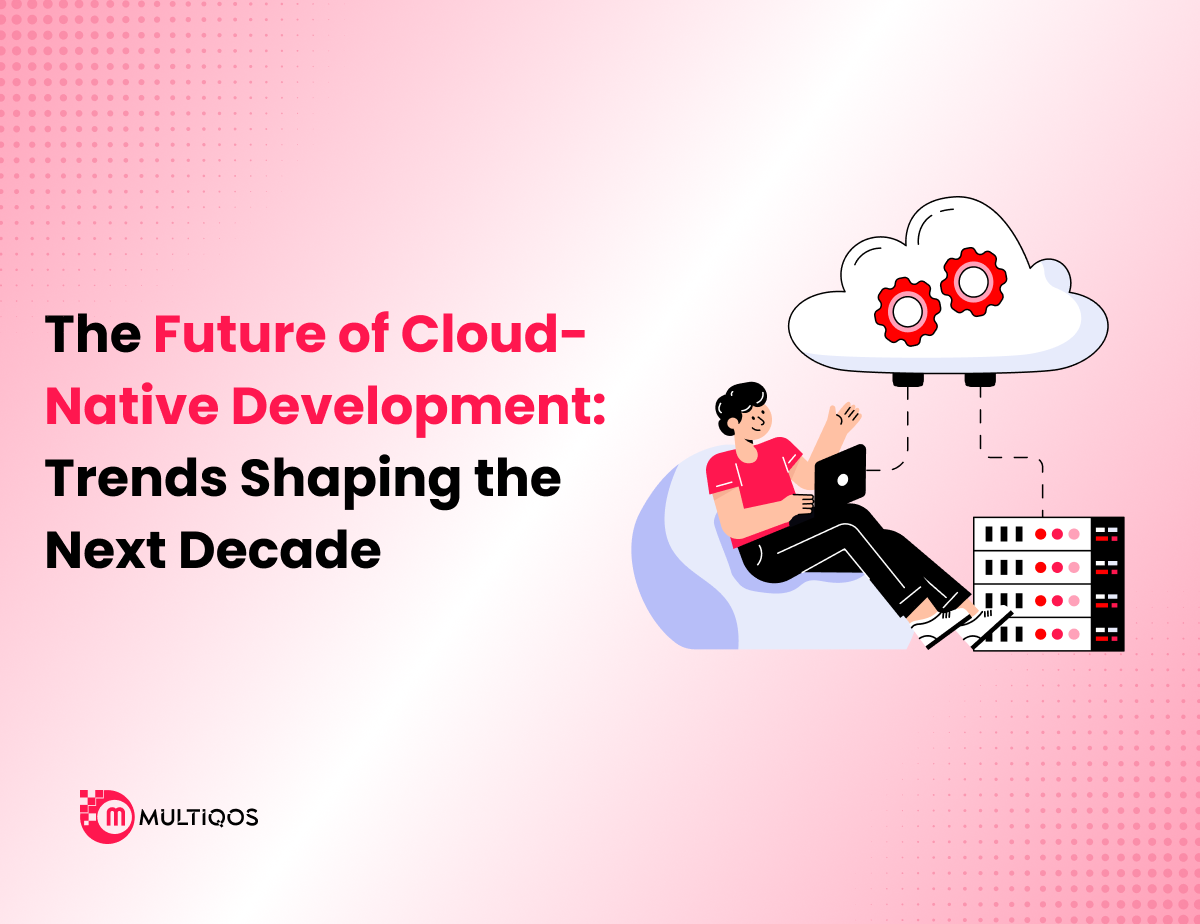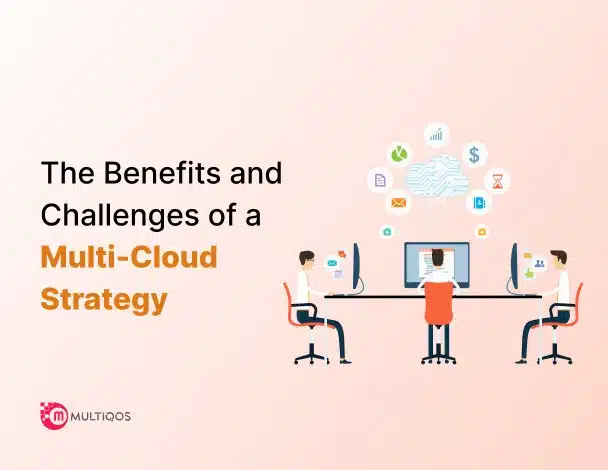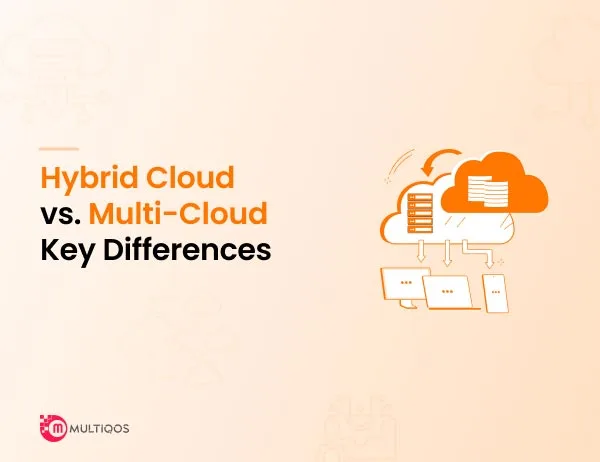AWS vs Azure vs GCP – A Comparison of Top Cloud Providers
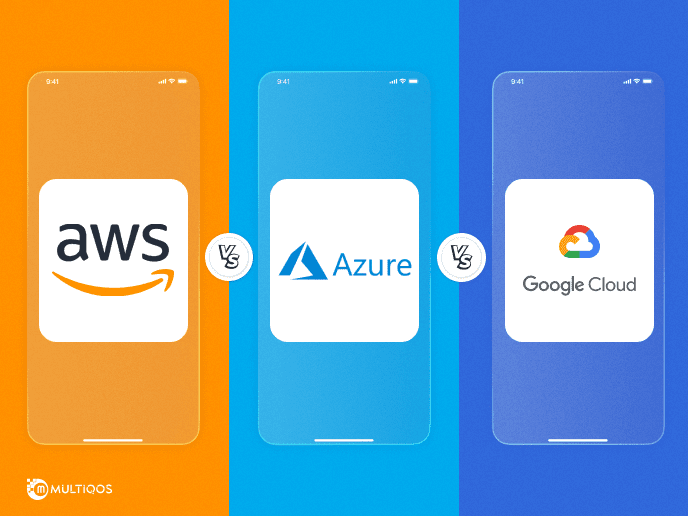
Which Cloud Platform Is Best?
The concept of cloud computing service has come a long way since its inception. The question that needs to be asked today is not whether or not to utilize cloud computing service models; rather, the one that needs to be asked is which cloud platform to employ. Amazon Web Services (AWS), Microsoft Azure, and Google Cloud Platform (GCP) remain the top three cloud service providers despite the oversupply of cloud service providers that have entered the market. The question now is, how do you choose between the two options? In the middle of all the talk about AWS, Azure, and Google Cloud, how are you supposed to decide on mobile app development? There are many parallels between Amazon, Microsoft and Google; however, there are also many key distinctions (Google Cloud).
Let Us Have a Look at Each Cloud Provider in Detail
Amazon Web Services (AWS)
Amazon Web Services (AWS) is a subsidiary of Amazon.com, Inc., which operates the world’s most successful online retail business. Amazon Web Services (AWS), the cloud platform with the greatest experience, offers a wide range of services to customers of all sizes, from sole proprietorships and small enterprises to multinational organizations and national governments.
Amazon Web Services (AWS) is among the reputed cloud computing service providers that started as an internal cloud service for companies. Cloud services such as Amazon S3 for data storage and elastic computing were made available to the general public for the first time in 2006. (EC2). Amazon Web Services (AWS) already offers more than 200 services that are complete in every respect and can fulfil the needs of millions of clients.
Why Choose AWS?
Data gathering may be made more streamlined and adaptable with the help of serverless technologies such as Amazon Kinesis Streams, Amazon SQS Queues, and AWS Lambda Functions. All aspects of a computer system, including web application platforms, operating systems, database management systems, and programming languages, may be modified to meet the specific requirements of an individual business.
CloudTrail and Amazon CloudWatch are examples of AWS management tools offering cloud computing services that can be used to monitor and record user behaviour. AWS Config is another tool that can be used to keep track of resource inventory and modifications. As a direct consequence of this, businesses get significant benefits from AWS in terms of their levels of productivity and profitability. One of the drawbacks of using AWS is that it has a complex architecture and predetermined service constraints based on normal client needs. Amazon, one of the three most prominent cloud service providers, has the most data centres, with a total of 84 located in various parts of the world.
Google Cloud Platform (GCP)
The Google Cloud Platform is one of the cloud computing web services that Google provides (GCP). The name for this particular portion of Google Cloud is Google Compute Engine (GCE). The Google Cloud Platform made accessible to the general public a wide variety of computing, networking, and big data capabilities in 2010. This service began in 2010. Google Workspace, Chrome OS, and corporate Android are some of the cloud computing services Google that is now included in the Google Cloud Platform, often known as GCP.
Google Cloud Platform (GCP) is the most diminutive of the Big Three cloud providers compared to AWS and Azure. However, since such a diverse selection of cloud services is accessible, almost any kind of application might take advantage of them.
Why Choose GCP?
Because of its intuitive graphical user interface (UI), lower prices, preemptible instances, and flexible computing options, Google Cloud Platform (GCP) is an attractive alternative to both Amazon Web Services (AWS) and Microsoft Azure for iOS or android mobile app development
. Google encrypts all data and communication channels, including the traffic between its many data centres, to the greatest degree that is humanly feasible. There are several areas in which Google Cloud engages in severe competition with AWS, including instance and payment setup, privacy and traffic security, cost-efficiency, and machine learning.
All three cloud providers provide up to 75% discounts for web development. Still, Google is the only one that additionally provides a sustained use discount of up to 30% on any instance type that runs for more than 25% of each month. A selection of application programming interfaces (APIs) made accessible by Google may be used, among other things, for computer vision, natural language processing, and translation. Developers of machine learning software can build their models with the help of Google’s Cloud Machine Learning Engine’s TensorFlow deep learning library.
Microsoft Azure
Microsoft Azure is the cloud platform that has the second-largest market share. Since its introduction in 2010, Microsoft’s Azure cloud platform has grown to include more than 200 individual products and services. It is now one of the cloud platforms growing at a rate that is among the fastest accessible.
When it comes to cloud computing service types and hybrid cloud environments, many businesses may easily move to the cloud or hybrid cloud thanks to Microsoft Azure, which offers a wide range of services that are specialized to Microsoft businesses. This makes a move to the cloud or hybrid cloud an attractive option for many businesses. Microsoft Azure is used by more than 95% of companies in the Fortune 500, which is evidence of the company’s capacity to service huge firms. In point of fact, Azure is not limited to being used with Windows. Due to the fact that the platform is open-source, there are no limitations placed on who may build and maintain applications.
Why Choose Azure?
No of the size of the business, Azure Site Recovery makes it possible to organize site-to-site replication as well as data recovery. Redundancy for data storage is provided via Zone Redundant Storage across many data centres in the Azure cloud (ZRS). Azure ExpressRoute creates a link between the data centre and Azure that runs over a private network rather than the public Internet. This connection is safe, dependable, and has minimal latency.
Multiple site-to-site connections to virtual networks are supported, as is the ability to link virtual networks located in different regions to one another by utilizing Azure’s extensive networking capabilities. In addition, multiple site-to-site connections to virtual networks can be used simultaneously. Azure offers the most competitive prices for on-demand and reduced instance rates of any cloud provider. The Azure Machine Learning Studio is a very useful tool for the creation, testing, and deployment of many types of algorithms.
Feature Comparison: AWS Vs. Azure Vs. GCP
Computation
AWS
The most popular computing service that Amazon offers is called EC2, which stands for Elastic Compute Cloud. The EC2 cloud computing platform offers various features and capabilities, including support for Windows and Linux, bare metal instances, GPU instances, high-performance computing, intelligent scaling, and more.
Microsoft Azure
The primary cloud computing services types that Microsoft Azure provides is known as Virtual Machines. In addition to its many other characteristics, it is capable of running Linux and Windows Server, as well as SQL Server, Oracle, IBM, and SAP. Additionally, it offers enhanced security, the capacity to handle hybrid cloud environments, and integrated support for Microsoft applications.
Google Cloud
The library Google cloud computing service is far less extensive when compared to those of its competitors. It is known as Compute Engine and provides several different machine types, including bespoke and preconfigured ones, per-second invoicing, compatibility with Linux and Windows with automatic discounts, and a carbon-neutral infrastructure that consumes half as much energy as conventional data centres.
Storage
AWS
The Simple Storage Service, often known as S3, is one of the cloud computing amazon web services. This protocol has become the industry standard and is provided by the vast majority of the most prominent service providers in the world (e.g. GCP). Massive block storage is also offered by Amazon’s Elastic Block System (abbreviated as EBS) (EBS). Amazon’s Simple Storage Service (S3) and Elastic Block System (EBS) are two options for storing enormous amounts of block data, respectively (EBS).
Microsoft Azure
Much like Amazon Web Services (AWS), Azure offers a broad array of cloud-based hosting services to accommodate a diverse range of business needs. Large businesses with considerable needs for data storage might benefit greatly from using either the Data Lake Storage or the Queue Storage features offered by Microsoft Azure. Blob storage might be very beneficial to an organization if they need to store a large amount of unstructured data. On the other hand, file storage is trustworthy and can easily accommodate the vast majority of business requirements.
Google Cloud
Only cloud and persistent disk storage are available via Google, with a much smaller selection of storage options than those supplied by the other two providers. On the other side, GCP provides users with reliable and well-supported SQL and no-SQL databases for their data storage needs. There are just two different kinds of backups that Google offers: a Coldline backup for content that is viewed less often and a Nearline backup for data that is visited regularly.
Also Read: Firebase Vs AWS: Which One Best in 2024?
Pricing Structure
AWS
The lack of transparency in Amazon’s price structure is one of the factors that customers find most confusing. Although it provides a cost calculator, it is difficult to generate an accurate estimate due to the large number of parameters involved. According to Gartner’s research, a complex granular pricing structure is the most effective method for navigating cloud computing services for Amazon. This is to use a cost management solution provided by a third party.
Microsoft Azure
With Microsoft Azure, things are already very straightforward. Understanding Microsoft’s pricing system may need the assistance of a knowledgeable third party or significant prior experience.
Google Cloud
On the other hand, Google makes a point of separating itself from its competitors via its pricing. The firm is making an effort to expand its client base by offering “consumer-friendly” pricing that is lower than the list prices of its rivals. According to Gartner, “Google uses substantial discounts and extremely flexible contracts in order to try to acquire projects from customers who are already spending a significant amount of money with cloud rivals.” Google’s main competitors include Amazon Web Services, Microsoft Azure, and IBM Cloud.
How to Choose a Cloud Service Provider?
Because of this, among other reasons, Amazon Web Services (AWS) continues to be the industry leader for mobile app development in terms of delivering the greatest number of different capabilities at the most advanced level. It is still the clear leader in the market, even though its advantage is rapidly diminishing. Large companies should strongly consider this alternative because of its extensive range of goods and services and the business-friendly nature of its overall design. Meanwhile, its enormous and continuously growing infrastructure makes it possible to make huge cost savings, which in turn makes it possible to lower prices in an even more aggressive manner.
There is a significant difference between the two. Still, Microsoft seems to be making strides in closing the gap with its ongoing investments in expanding the Azure cloud platform and its future ambitions to expand its partnerships with on-premise software. It is anticipated that Microsoft Azure will continue to be an attractive choice for businesses that have already made substantial investments in Microsoft’s technological capabilities and developer skill sets.
In addition, Google’s new leader puts the company in a position to become a more formidable competitor in the corporate world. It was already making gains with select customers because of its expertise in Kubernetes and machine learning; nevertheless, it has a long way to go before it is regarded as a genuine alternative to existing business models.
Summing Up the Top 3 Cloud Platforms
Microsoft and Google are both rapidly growing in order to compete with amazon cloud computing service, which is now the market leader in terms of both capacity and service. On the other hand, Microsoft places a significant emphasis on businesses, positioning it as a formidable competitor to Amazon Web Services (AWS). Meanwhile, Google’s integrations with third-party services and open-source projects are continuously developing and improving. At the end of the day, of course, it all boils down to the particular use case that you have in mind. Businesses are looking for multi-cloud solutions more often so that they may use the features offered by several cloud providers without being locked into a single cloud vendor.
Let’s Create Big Stories Together
Mobile is in our nerves. We don’t just build apps, we create brand. Choosing us will be your best decision.
Have Some Questions Relating to Cloud Platform? Get All the Answers Here.
By learning everything about your brand, your target audience, your KPIs, and your back-office dependencies, we set out to create tactful digital.By learning everything about your brand, your target audience, your KPIs, and your back-office dependencies, we set out to create tactful digital.
By learning everything about your brand, your target audience, your KPIs, and your back-office dependencies, we set out to create tactful digital.By learning everything about your brand, your target audience, your KPIs, and your back-office dependencies, we set out to create tactful digital.
By learning everything about your brand, your target audience, your KPIs, and your back-office dependencies, we set out to create tactful digital.By learning everything about your brand, your target audience, your KPIs, and your back-office dependencies, we set out to create tactful digital.
Get In Touch

